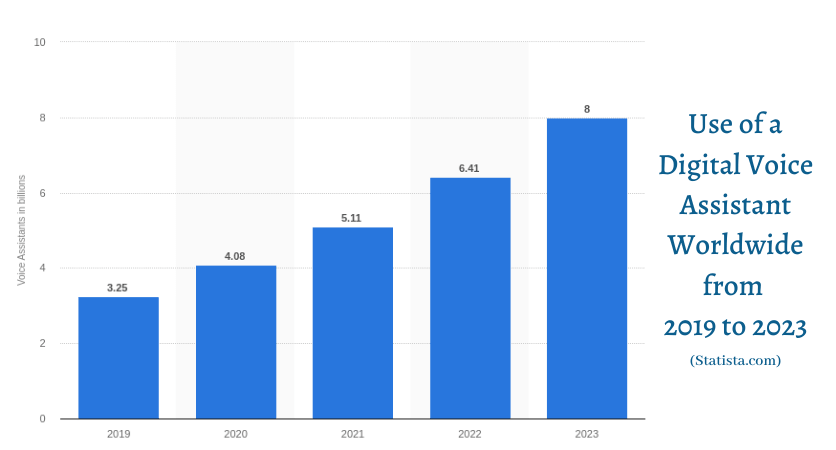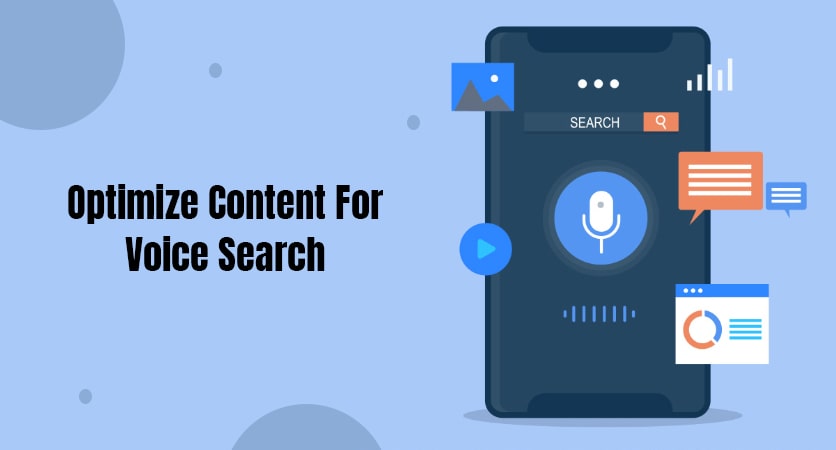
How do you consider Voice Search Revolution?
Is it legitimate or deceptive?
Voice Search has gained momentum because the users find it easy to speak by an assistant than to type. And, the results it is getting are remarkable.
Though, it has commenced as a small concept but, now, if we look at the picture, it has one of the great topics in the search industry. The comfort in searching is second to none, and the users are not getting enough of it.
The next question that came to our mind is- is your business a voice search ready?
If yes, then you are on the right track. A study reveals that just 4% of the U.S. businesses with a dynamic location are voice search ready. Surely, the chances that you are on a list of 96%.
The voice search was started with the smartphones and then soon intensified to the voice assistants and smart speakers all around.
Nowadays, everyone is experiencing the revolution of voice search and is welcoming its new ideas with open arms.

The above figure shows the use of a digital voice assistant worldwide from 2019 to 2023. The values are in billions.
Till now, we have gathered the recent statistics that show how the users are using the Voice search.
As it is known that the voice search is accelerating rapidly, so, it becomes crucial to look at the recent statistics. These statistics will help you to know how it can change your business.
Significant Voice Search Data
- It is found by BrightLocal in 2019 that more than 75% of the smart speaker buyers search for the local businesses in a week. To elaborate:
- There are 54% that are reserving for drinks and food.
- Those who ask the price of some specific products from the local businesses are 46%.
- 40% likes to know if the particular product is in the business.
- There are 35% who books an appointment in the beauty industry.
- From the 3.5 billion searches on Google, a third of those are voice searches. (TheeDesign, 2017).
- Astonishingly, there are 60% of users of a mobile personal assistant (Thrive Analytics, 2014).
- The voice search queries are categorized into four categories- 27% personal assistant, 30% general information, 21% fun, and entertainment and 22% local information (Search Engine Land, 2016).
- The voice search queries are generally more extensive as compared to text searches. They are three to five keywords long and begin with what, who, why, where, when, and how (Campaign, 2016).
- There are around half of the search users who have expressed satisfaction with the voice assistants. 12% are dissatisfied, and 38% are neutral (Search Engine Land, 2016).
- There are 60% of users who are using voice searches at home, whereas there are 57.8% who use voice searches on smartphones. (Stone Temple, 2017).
- ComScore says that 50% of the web searchers will be performed by voice searches in 2020. (Campaign, 2016).
What Did We Examine?
The above statistics clearly depicts there is almost a quantum rise in the voice searches. And, it makes it essential to generate the content which is fully optimized. Or else, it won’t be very easy to get organic traffic. If we take a look at the competition to get the search engine ranking, we can only conclude that the competition is getting tough regularly.
What is Voice Search Optimization?

Precisely, voice search is the form of voice recognition technology that permits the user to execute the searches by speaking to the device. Obviously, the devices could be computers, smartphones, home assistant devices.
There is an immense rise in the google voice search queries from some years. Therefore, it becomes critical to know this development and include them in the digital marketing strategy.
Why Voice Search Optimization Critical to Business Owners?
What if your digital marketing strategy makes a direct impact on your business profit. And you consider voice search as one of those strategies. Imagine the rate of success you can get.
Also, it depends on the way you are adopting this strategy. How well you are integrating it can make a positive or negative impression on your business.
If we look at the expanded landscape, then, it is evident that it will improve the customer experience in the search engines. Surely, it will provide more adequate, convenient, and faster results. This only implies that if you have optimized your content efficiently, then you could be the leading digital assistant suggest.
According to Shane Barker, the digital marketing strategist-
“Facilitated by the launch of voice-based digital assistants like Siri and Alexa, voice search now constitutes a significant part of all online searches. And its share is only going to rise to a level that SEO experts can’t deny its importance.
The question is, who will be best prepared when voice search takes up a majority share of all searches? And the answer to that is SEO experts who are devoting their time to it now.
However, there is another side to it. Though voice searches are likely to be a really important part of SEO in the future, it is not the case now. While my advice would still be to start preparing for it, I would advise against allocating a substantial part of your budget to it.”
From this apprehension, it can be concluded that learning the nuances of SEO is important for voice search.
Some Use Cases of Voice Search
- Many smart devices, like, tablets, speakers, phones, temperature controls, lighting, etc. have made an outstanding appearance. The users these days prefer to centralize the smart devices in one “smart hub,” and intelligent speakers are the best options to go with.
- Many universities are testing the Echo Dots. These are connected to the student’s university account. Those who are included in this trial can determine the information Alexa has the authorization to. Therefore, with Alexa, you execute the below tasks.
-
- Tuition payment information
- Finding food and services nearby
- Class schedule for the day
- Setting alarms before classes
- Meal card balance
- Amazon and Marriot have collaborated for launching Alexa for Hospitality. This will be ready this summer in almost 10 Marriott locations. A virtual assistant can help users with tasks such as:
-
- Finding local restaurants and attractions
- Controlling in-room temperature or lighting
- Ordering towels
- Checking out
- Calling
SEO Strategies to Optimize Your Content for Voice Search
User intent
When we search for anything on the website either, we want to grasp some information, or we want to purchase something. Hence, With the user intent, you can get to know the reason behind any search.
Most of the time, the intent can be predicted easily. The words they use to type the query like “what is”, “how-to”, “price,” “buy” can define what exactly they like to search. But, there are cases that their intention can hide in their minds only. And, it can be expressed easily is not apparent.
But, because of the Hummingbird update, Google gets in-depth in the context of the search query. Therefore, it examines the website’s content and gives you the answers, which seems to be more relevant.
For example,
if you are searching for the “Golden Globes” winners and obviously you are searching for the recent award ceremony, not the awards handled a few years back.
The search engine grasps it adequately and considers it. Hence, examining the user intent while creating the content is a must to improve the relevance of the pages to particular search queries.
Therefore, if there is a requirement of optimizing the page for the featured snippet, then the first and foremost thing is to comprehend the user intent and provide the best and prompt answer to the users.
Jenny Halasz, SEO & Analytics Consultant, says:
“Try to match your customers’ intent with your content, seek to answer questions, and provide details wherever possible. The same steps you take now to optimize for answer boxes are going to help you in voice search too.”
Optimize for Rich Answers

As per the SEMrush voice search study, “70% of all answers returned from voice searches occupied a SERP feature (with 60% of those returning a Featured Snippet result).”
The odds are the most intelligent devices besides voice searchability. It will provide you the same answer to an appropriate question, and that mainly will be the rick answer. In addition, look at some of the SEO related terms to get it properly:
Knowledge Graph
It is the Google knowledge base that absorbs and stores every fact related to the thing, place, and people.
Knowledge Panel
It is the information that can be seen in the right of the search result when some query related to business is searched on Google. Knowledge Graph is here to provide all this information.
Knowledge Box
It is the same as the Knowledge Panel. It gives accurate information that comes from the knowledge graph and is shown precisely like other search results.
Featured Snippet
The featured snippet is a part of a third-party source. Google shows this information on the top of the results above the ads with attribution to the original source. It is practiced to offer users concise and quick answers.
Rich Answer
When the search results integrate any of the features mentioned above, then a rich answer is obtained. For outstanding user experience, Google generally shows the rich answers to all queries. And, a considerable rise has been seen for a long time.
Long-tail Keywords & Questions
While the user searches for information on voice assistants, they act as if they are talking to a human. Small and choppy keywords are not used much as long paragraphs, and questions are asked generally.
It is advised to use the conversational phrases and keywords that the user uses while communicating, not while talking. Notably, these are the long-tail keywords but are phrased the way the user speaks.
Apart from this, the long-tail keywords are the best practice not for the traditional SEO but for voice search optimization. Though, the key phrases, including more than two words, encounter less difficulty and provide more chances to give you the top ranking.
Consider the situation, while searching for the best coffee in the city, you will type the relevant keywords, “Best coffee in Singapore.”

Whereas, voice query is more natural. Like, speaking to the voice assistant, you will start with “Ok, Google….”, or “Hey Siri…”. The mentioned phrases will make you feel like you are talking to the device and is not using a keyword-based query.
Accordingly, when you are looking for the best coffee, then you can ask a question, “ Where I can find the best coffee in LA?”
Use Conversational Language for Content

Be conversational- it is the main characteristic of the voice search query. And, it would help only if you took benefit from it. If you use more complicated (robotic) language, then there are very fewer chances that your content will appear in the voice search queries or results.
Using plain or natural language in every content would be beneficial. It is because of the reason that the natural language improves the scope of matching with the verbal questions.
Knowing the searcher intent is also significant, as we have mentioned earlier if you want to understand how the user is asking the verbal questions.
Understand and implement the query style that the users use while practicing the voice search.
- The usage of question keywords by users.
- What about the conversational style?
- The questions that the users can ask the most.
- What answers are suitable for queries?
- Find the performance of the answers as voice search results.
With the questions mentioned above, you can have an idea of what the users want while searching conversationally.
Page Loading Time

Page loading time is the time that the webpage takes to open. This aspect also determines whether or not the page will emerge in the voice search results. Even though it is the vital element for the voice search but majorly gets unnoticed. However, it does not reduce its importance a bit.
The users reject the website that takes longer than usual time, and they move to the website that loads quickly. The website loading time speed has a direct influence on the bounce rate and, therefore, should be optimized.
For some convenience, Google has launched the Speed update that focuses more on website loading time optimization. When it is about voice searches, the guidelines are the same. Voice searches demand quick results, and when you have a slow website that takes forever to load, the content will be used to answer the verbal query.
Imagine a picture where the user is using the voice search and is in a hurry, here, page speed optimization plays an important role. As the primary step, examine the current website speed with the PageSpeed Insights.
With the help of these tools, you can understand if your website’s current loading time is fast, and if not, then the guidelines can help to speed up the page speed.
Checklist for the Good Website Loading Speed
- Use compressed videos and images on your website.
- Use “defer” and “async” to decrease JavaScript parsing.
- Practice HTML5 and CSS3 frameworks to load mobile web pages swiftly.
- JavaScript and Minify Style Sheets and reduced HTTP requests.
- Decrease redirects and the plugins you use.
- Considers a Content Delivery Network (CDN).
On an all, Slow page loading speed can influence the website conversion rate.
Note: Don’t forget that mobile speed is more significant than the desktop for voice search optimization. It is applicable to the entire design as well. Assure that the website is responsive as the mobile devices conduct most of the voice searches.
Structured Data
The integration of the code with the HTML markup is Structured data. Indeed, most of the search engines are practicing this to know the website content.
With the structured data, the users can assist the search engines in crawling and reading the content effectively.
Schema Markup
Using the schema markup, the users can manage the way they are providing information about their business and how the machines are interpreting it.
Using the structured data results from the rich snippets, it can improve the Click Through Rate (CTR) and get more traffic consequently. With this data, the web pages can appear in the featured snippets and in the voice search results.
Particularly, the structured data markup provides better information to the mobile devices regarding the website and the content.
Schema.org
Schema.org vocabulary is used to discover how you can use the structured data on the website. It has many schemas that enable SEO experts to markup the websites.
Do not forget that it is easy to be spammy while detailing the structured data. Use only the data which is related to the content you contribute. Also, updating the markup on a regular basis is also decisive because everything is changing constantly.
Be Mobile
At Google I/O 2019, big announcements were made that were related either to mobile or tools associated with mobile. Mobile experience and pledges are the main aspects to emphasize.
Mobile holds the tendency to beat other devices when it is about voice search queries as users ask more questions on mobile. Delivering the best experience to the users is very advantageous.
Generating mobile-friendly content with the mobile-first approach is critical. Some of the key ideas to consider are :
- Create a mobile-responsive website design.
- Administer a mobile-friendly test for the website and optimize it accordingly.
- The website should be crawlable to guarantee visibility and appearance to your content.
- It is the future of search that integrates the vocal queries as well. Being available to the mobile responsive website is the best SEO practice that you can afford to ignore.
Over to You
Many businesses are using voice search. It is evident that in the coming years, its popularity will increase dramatically. It will be everywhere, and everyone will be using it.
We have mentioned the SEO strategies for voice search optimization. These will surely help you rank better in voice search and will create a better voice search optimization strategy.
Let us know which strategy works best for you. And if there are other vital strategies that we have missed. Either way, leave a comment below.
We would like to hear from you.
Thank you for reading!!
